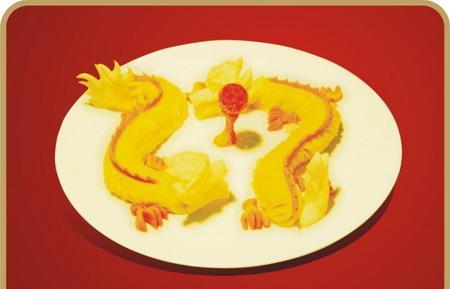
Dragons are popular "animals" in China. Since ancient times, people have both revered it and approached it; they have worshipped it as a deity and used it to beautify their lives and create a colorful "dragon culture". In terms of catering and cuisine, people often give the image of the dragon and the spirit of the dragon to delicious dishes, and cook a variety of "dragon dishes".
There are many dishes named after dragons in various parts of China, such as "dragon's eye phoenix liver" in Shandong, "dragon's whisker fish noodles" in Jiangsu, "dragon's body anchovy shrimp" in Fujian, "flying dragon soup" in Heilongjiang, "dragon play phoenix" in Beijing, Liaoning and other places... They are all famous dishes that have long been renowned. The reason why these dishes are famous is that of course they are of excellent quality and high cooking skills, but because they are stained with "Dragon Ze", they enrich the image, improve the taste, and are more attractive.
There are also "dragon dishes", which are the "dragon meat" advocated by the ancients. Although in today's eyes, dragons are imaginary "animals", the ancients believed that dragons not only existed, but also that dragon meat was excellent "delicious". The "Twenty-Ninth Year of Zuo Chuan Zhaogong" records that in the Xia Dynasty, there was a man named Liu Lei who once learned to "disturb the dragon" with the Feng Long clan. Later, when a female dragon died, he salted the dragon meat and offered it to Xia Hou. After Xia Hou tasted the delicious taste of dragon meat, she did not eat enough, so she sent people to ask Liu Lei again. Liu Lei couldn't get it out, and fearing that Xia Hou would blame him, he secretly fled to the state of Lu... The "Biography of Zhang Hua in the Book of Jin" also tells about eating dragon meat: Once, Lu Ji, a great literary scholar of the Western Jin Dynasty, entertained Zhang Hua and other literary friends with a "salted fish" sent by others. Zhang Hua opened the pot, tasted it first, and said, "This is dragon meat!" ”
Seeing that everyone was suspicious, Zhang Hua said, "If you don't believe it, just pour wine on it, and there will be magical changes." Someone immediately poured the wine on the "salted fish", and sure enough, it emitted a five-colored glow. Lu Ji immediately asked the person who sent the "fish" about the origin of the "fish", and the man said: "This 'white fish' was picked up from under the thatch in the garden, and its shape is very special. Marinate it into 'salted fish', the taste is extremely delicious, so I give it to you..." Although these legends are somewhat absurd, they carry the thickness and color of history, enriching the "dragon culture" at the same time, but also enriching the food culture.
There are also dragon dishes, which are both delicious dishes and have political connotations, and even related to the struggle for the throne and the change of the country. For example, the "panlong dish" in Zhongxiang County, Hubei Province, was famous in the Ming Dynasty and was one of the "imperial dishes" of the Ming Palace. This dish comes from a legend that before Emperor Mingwuzong died, he once passed on a decree to his two sons who had been enfeoffed to other places, who advanced to Beijing and who would inherit the throne. Zhu Houxi, the Prince of Xing, who was sealed in Zhongxiang County, Hubei Province, decided to disguise himself as a Qin prisoner and enter Beijing in order to save himself from many troubles on the Jinjing Road, and ordered the city's cooks to make a food that ate meat without meat overnight.
Inspired by sweet potatoes, a cook deboned and peeled fish and meat, chopped them together, and mixed them with various ingredients to make "sweet potatoes" with egg skins. Zhu Houxi ate such "sweet potatoes" all the way, and he was nutritious and time-saving, so he grabbed the advance in Beijing, ascended to the throne, and became the "Jiajing Emperor". Because of the merits of this "sweet potato" dish, it was given "Panlong Dish" by the Jiajing Emperor, and its reputation has since risen. The Ming Dynasty poet Fan Guokai once wrote a poem praising this dish:
Mountain treasures and seafood do not need to be provided,
Rich in water spring wine has a strong taste.
Full of guests to call for food,
Packed into a roll-cut numbered dragon.
Later, there was a new development of dragon vegetables: lean pork, fatty meat, fresh fish fillets, egg whites, mung bean dry powder, white onions, pepper, salt, etc. as raw materials, chopped into filling, gauze filtered and mixed with other ingredients, and then wrapped with egg skin, and finally coiled into a dragon shape, steamed into a cage. Therefore, the dish is bright in color, vivid in shape, fat but not greasy, long in flavor, and is well received by people, so it is included in the "Chinese Recipe" as a special famous dish, and is well-known at home and abroad. (Source: Qilu Evening News)